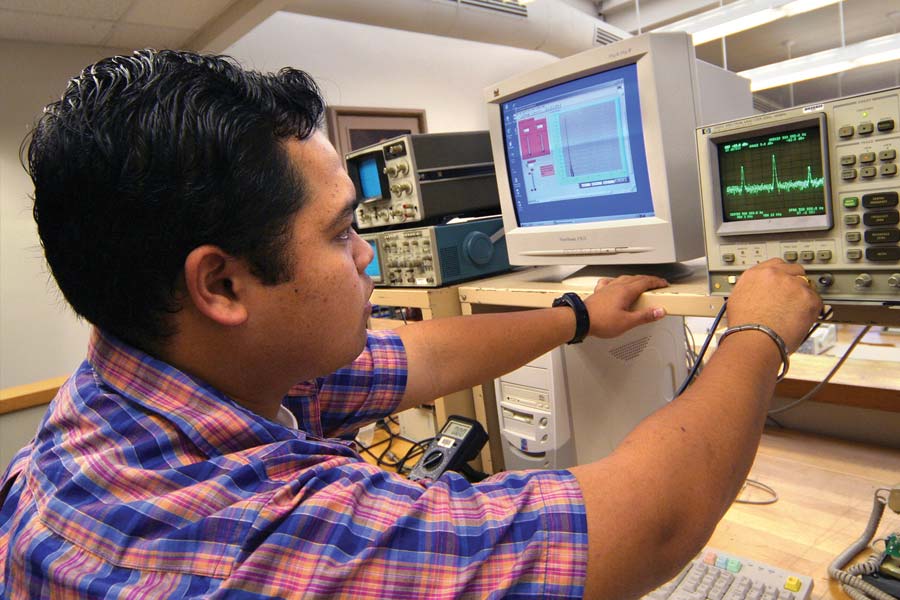Bachelor of Science (BS) in Electronics Engineering Technology
![]()
Earn a Bachelor of Science in Electronics Engineering Technology, design the future of electronics hardware
Why Pursuing a Bachelor of Science in Electronics Engineering Technology is a Bright Career Move
As the world rapidly evolves, we find ourselves consistently at the intersection of innovation, technology, and the human spirit. Central to this growth is the field of Electronics Engineering Technology (EET), a discipline that, for years, has fostered the creation and enhancement of devices and systems that shape our modern lives. With an ever-increasing reliance on electronics and technology, the demand for skilled professionals in this field is surging. Here, we explore why pursuing a Bachelor of Science in Electronics Engineering Technology is not just a smart career move, but a gateway to shaping the future.
A World-Driven by Electronics
Electronics are not just integral to our everyday lives—they essentially drive the world. From smartphones and home appliances to advanced medical equipment, space exploration tools, and cutting-edge defense systems, electronic devices are everywhere. A degree in EET provides a robust understanding of these electronic systems' design, development, and implementation, setting a solid foundation for a career that contributes directly to technological advancement.
A Booming Job Market
According to the U.S. Bureau of Labor Statistics, employment in the field of electronics engineering is expected to grow steadily. The demand for skilled professionals is driven by technological advancements, the need to upgrade existing systems, and the development of new electronic devices. Earning a Bachelor's degree in EET opens up numerous job opportunities. Graduates can work as electronics engineers, systems designers, project engineers, technical managers, and more, across a variety of industries.
Competitive Salaries and Benefits
A career in EET is not just intellectually rewarding—it's financially lucrative as well. According to Payscale, as of 2023, the average salary for an electronic engineer in the U.S. is around $100,000 per year, with high-earning professionals making significantly more. Moreover, a career in EET often comes with additional benefits such as health insurance, retirement plans, and opportunities for continuous learning and professional development.
Driving Innovation
Electronics Engineering Technology is a field where innovation thrives. Engineers work on the frontier of technological advancements, developing solutions to complex problems and creating devices and systems that were once mere figments of the imagination. As an electronics engineer, you will have the chance to contribute to advancements in sectors such as renewable energy, healthcare, telecommunications, transportation, robotics, and much more.
A Degree with Global Relevance
The skills and knowledge acquired in an EET program are not bound by geographical borders. The principles of electronics and technology apply universally, making this a truly global career. Whether you're interested in working for a tech giant in Silicon Valley, contributing to space exploration with agencies like NASA or SpaceX, or developing sustainable solutions for remote communities, a degree in EET can take you there.
Lifelong Learning
Technology is ever-evolving, and as such, a career in Electronics Engineering Technology offers continuous learning opportunities. From new software tools to emerging hardware technologies, there's always something new to explore and master. This constant evolution makes an EET career exciting, challenging, and fulfilling.
Pursuing a Bachelor of Science in Electronics Engineering Technology is a forward-thinking career move that offers vast opportunities. It's a field that enables you to contribute directly to society's advancement and offers numerous professional and personal benefits. So, if you're fascinated by how electronic devices work and want to be part of the technological revolution, a degree in EET might just be the perfect choice for you.
As an electronics engineering technology (EET) student, you'll prepare for a wide range of practical electronics technology jobs ranging from circuit analysis to digital design, control and robotics. You'll study circuit design and stimulation, network analysis and synthesis, transmission lines, and micro-system design. As a result, you'll find it easy to keep up with the constant advances in the electronics industry. Potential employers include Lockheed Martin, Intel, Texas Instruments, Boeing, IBM, Tesla, Google, Apple, and many others.
You'll study circuit design and stimulation, network analysis and synthesis, transmission lines, micro-system design, and fiber optic communications. You can take additional electives to specialize in area such as communications, computer design, control theory, micro-controllers, and telecommunications. As a result, you'll find it easy to keep up with the constant advances in the industry.
The program provides the essential knowledge to enter into the EET industry with careers, such as:
- Electronics Engineer - average salary, $77,1301
- Electronics Technician - average hourly pay, $20.78 (Median salary, $49,743)1,2
- Testing Engineer - average salary, $71,8801
- Integration Engineer - average salary, $85,4441
- Project Engineer - average salary, $68,5701
- Applications Engineer - average salary, $70,7851
- Sales Engineer - average salary, $72,6751
1. Salary based upon 2020 PayScale salary data
2. Salary based upon 2020 Salary.com data for Electric/Electronics Technician I
Why Capitol?
Our classes are taught by working professionals.
A field like electronics engineering technology is constantly evolving, which makes our faculty extremely valuable since many are experts in the field.
Our motto, 'find a way, or make one' delivers job ready skills.
Hands on classes, combined with extracurricular clubs like; League of Legends, the robotics club, and the gaming club help you hone the skills needed to excel in the workplace.
Support for you
Whatever type of resource you need –a way to improve your math skills, a place to exercise, help with a job search or a disability – we have facilities and personnel ready to help.
Our location puts you in the heart of the action.
The Baltimore, Maryland/Washington D.C. area has one of the largest concentrations of high-tech companies, defense contractors, and government agencies in the United States, making it easier to find internships and high-paying jobs.
Top Employers of Capitol Technology University's Graduates
Career Opportunities
The Capitol Commitment
We’ve created a game plan to make sure you find a job upon graduation. Learn more.
Degree Details
The bachelor of science in electronics engineering technology degree (BSEET) is a total of 121 credits, which covers technical courses, mathematics and sciences, English and social science courses.
Enrollment and graduation data for selected undergraduate degree programs is available at https://capl.ink/ABETUndergradData.
Tuition & Fees
Tuition rates are subject to change.
| Fall 2025–Summer 2026 | Fall 2026–Summer 2027 | |
|---|---|---|
| Tuition (per semester,12–18 credits) | $13500 | $13635 |
| Per-credit Tuition (over 18 credits) | $1125 | $1125 |
| Student Activity Fee (resident) | $189 | $204 |
| Student Activity Fee (commuter) | $106 | $115 |
| Information Technology Fee (per semester) | $440 | $450 |
| International Student Fee (per semester) | $824 | $824 |
| International Student Application Fee | $50 | $50 |
| Fall 2025–Summer 2026 | Fall 2026–Summer 2027 | |
|---|---|---|
| Tuition (per credit, on-campus, online, or independent study) | $869 | $875 |
| Student Activity Fee | $22 | $25 |
| Information Technology Fee (per credit) | $45 | $55 |
| Fall 2025–Summer 2026 | Fall 2026–Summer 2027 | |
|---|---|---|
| Tuition (standard rate, per credit) | $455 | $460 |
| Tuition (partnership rate, per credit) | $360 | $375 |
| Information Technology Fee (per credit) | $45 | $55 |
| Fall 2025–Summer 2026 | Fall 2026–Summer 2027 | |
|---|---|---|
| Tuition (active duty, per credit) | $250 | $250 |
| Tuition (retired duty, per credit) | $769 | $769 |
| Information Technology Fee (per credit) | $45 | $55 |
- All full-time students who keep their student account current are promised their tuition will not increase more than 1% per year for four years.
- Please visit our myCapitol portal housing costs page for details on Capitol Technology University's modern residential facility.
Related Information
The BS degree in Electronics Engineering Technology is accredited by the Engineering Technology Accreditation Commission of ABET (www.abet.org) under the commission's General Criteria and Program Criteria for Electrical/Electronic(s) Engineering Technology.











